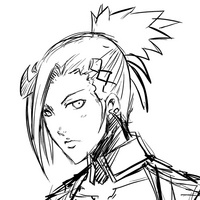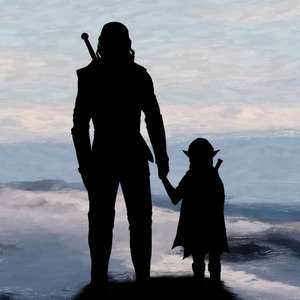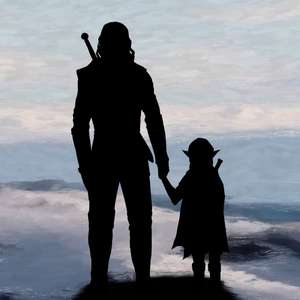Three hot, sweat-dampened days passed, and then a fourth, when the first signs of the clever plan’s success became known. Fast riders on horses, horses no doubt gifted them by the traitorous people of Myr, attempted escape and alarm, but were cut down with crossbow and sword. Upon the sixth day, it was deemed by Jaris appropriate to set to foot and let his blade finish those whom the poison had not.
So, with Pinion and a second man beside him, did Jaris approach the fortified settlement. The picture there was as he had envisioned it, with Hob large and small laid out in the fields and muck just as the people of his fiefdom had been, picked at by the ravens.
Passing near some rocks that afforded a degree of concealment, the three men were accosted by a thirst-maddened Hob warrior. He leapt at them with great fury and a blade forged of fine steel, screaming “Murderer!” with all his might, though being in the language of the Hob this sounded to the men much like the sound a dog might make when choking upon a piece of meat too large for its throat. Jaris, a swordsman of impeccable instinct, parried the desperate blow and drove his blade to its hilt through the creature, and gazed coldly at it as the life left its eyes, another drop of Hob blood spilled on the vengeance burning within him.
Encounters such as this played out here and there among the warriors, but few were the Hob who had survived the cunning ploy, and none those who survived past midday. With their work done and band regrouped, Jaris took to wandering the area unaccompanied, viewing the results of his fated strike of retribution, in hopes that it might offer some measure of solace for his tear-stained heart.
A while passed and Jaris happened upon a scene that was precisely what he had sought. In a flat, dusty place near a small hut there lay on her dirty-clothed belly a Hob female of adult stature, body putrified by the hot sun and with flies buzzing about in great number. Nearby lay another Hob, of child-like size, curled near a dry puddle, freshly enough that the ravens had not yet set to work. Jaris nodded in silence at the justice of that wrong which these monsters had done being wrought upon them in equal measure.
He then heard a sound from a bush nearby that caused him to bear his blade. Upon investigation he discovered there a small Hob girl-child, who might have seen four harvests if they were to grow as a child of Man did. She had hid herself there, surrounded at her feet by what looked to Jaris as little cakes formed of mud and switchgrass. She started at the sight of him and recoiled.
“Step out from there,” he said in a manner lacking all compassion, which the Hob-child, to his surprise, did.
Her form was miserable, even for a Hob—wan and bony, by all appearance half-starved and weak from thirst, with lips dry as the dust that covered her hair. His grip upon his sword tightened, within him the intent of carrying out in like form that which had been done to his own child, who was of similar size when so cruelly struck down.
“I’m sorry,” said she in the common tongue of the Realm, which took Jaris aback, for he had not before heard a Hob speak it. “Mother said I should not speak to Men, but have you any water?”
“Why?” Jaris queried, though he felt the answer obvious.
She answered as children are wont to, with more particulars than the questioner intends.
“I am terrible thirsty, so mother must be also. She said we must not drink from the stream, only the wash-basin. Brother and I are good and we did, and mother said she did not need any, but then she got ever so ill and then would not get up no matter how we tried to wake her. Then brother said I should have the last of the wash-water for myself, and that he did not need any, but he got ill as well and now he is also sleeping so soundly. I asked if I might drink from the stream, but mother would not answer. I thought she might be angry, and so I was making her a garland. And some breads, for we have no supper, either.” In the girl’s hands was evidence of the former, a crude strand of weed-flowers, and in the bushes her play-bread of mud and grass.
This was in no way what Jaris had expected, nor wanted, by way of answer. He took from his side a flask of water and handed it to the child. Again defying his expectations, she did not wet her parched lips with it, but carried it to the body reeking in the sun and knelt beside its head.
“Mother, I have some water for you. Please wake up and take it,” she said, unknowing that the ears of her mother could not hear her. She poured a bit of it on the leather-dried lips of the corpse, and, seeing no response, began to sob quietly.
Jaris observed this scene and could glean from the child’s words what had transpired in the days previous. He looked at the clawed hand of the larger body and spied in it a lock of Hob hair, tied carefully into a ring with a crumbling dry-pressed flower of crimson at its center. This was the custom, he well knew, among the Northlanders of the lowest classes, when the man of a house was called up to serve his Liege.
“Where is your father?” Jaris asked.
“He has left, with the Men, to go south two harvests past,” she said. “But he has not returned and mother says we must go on without him. I am so sorry mother, I promised I would not cry, but I cannot help it just now.” So said the girl, tears falling upon her pathetic garland of weed-flowers.
Jaris took from its place next to his breast a dry-pressed flower and its wreath of flaxen hair, now crumbling but held in such tender care, and cast his eyes from it to the keepsake the Hob woman clutched in her hand.
That part of his mind which took in situations and drew from them logical plans bade Jaris take his sword to the girl-child. Not of vengeance, as he had intended but a moment earlier, but pity, for it would not be long before thirst or hunger would do what the poison had not, for the warning of her mother.
Another corner of his mind, where humility hides, whispered to him to put that sword to his own throat, in penance for what he had become.
Be it by the intent of the Fates or in open rebellion against their cruel plans, something else entirely transpired. Jaris returned his sword to its place against his back and reached down to the girl.
“Your mother cared well for you, but she cannot be with you now. Take some of that water, and come with me.”
The child pondered this a moment before the meaning was clear to her. After drinking of the flask and offering Jaris thanks for it, she laid the garland about her mother’s neck and rubbed at her tears and said, “Goodbye, mother. Goodbye brother.” And then she grasped with her tiny hand, covered in dirt, that of the Knight above her, and followed him away from the place of death she had called home and down a path of no less danger but greater hope.











Comments (0)
See all